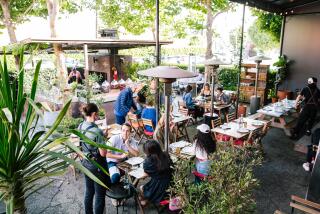A Thirst for Company--and More
- Share via
Daily, Jeff Arzouman entertains a steady stream of regulars. When they sidle up to his bar, he’s ready with a good word and their favorite pour. But not surprisingly, things of late have been distinctly irregular. “There’s one guy who comes in all the time,” says Arzouman, who tends bar at the Balboa Saloon in Newport Beach. “He’s not really a drinker. Usually he’s just there for the conversation. He always orders a white zinfandel.” But a week after the bombings, says Arzouman, “He came in and ordered a Bourbon. Up.”
At first, Arzouman didn’t put two and two together, but as the days unspooled after Sept. 11, he noted a distinct shift in his clientele. People who normally only drank beer were ordering shots alongside; others took their medicine straight, no chaser.
Another salient shift: “People have been coming in just to talk,” says Arzouman, whose place has been full of regulars as well as a sampling of new faces, ranged around the bar peering at the coverage on CNN and bent on drinking and commiserating.
Experts in trauma say this is only the beginning.
As some Americans begin to surface from the shock of the terrorist attacks, what’s to follow is an emotional grab bag: “Shock,” says Patricia D. Johnson, an L.A.-based therapist, “is emotional anesthesia.” Now, as the shock wears off and people begin to confront the full sweep of loss--the physical loss of a loved one, the existential loss of their own sense of security--for some, what comes next might be denial. For others it might be rage. Still others might be feeling the edges of depression setting in like a dense, late-afternoon fog. And, adds Johnson, “For some, self-medicating can be a response. It’s how one handles those overwhelming feelings.”
Jeff Softley’s bar at Pinot Bistro in Studio City is loud, chaotic and standing room only. That might not be remarkable on a weekend, but on Thursday night? At 9:45? In the Valley?
Softley’s a blur. So is his chrome shaker. And so are conversations whipping around the dark wood bar. “You think they might never find Bin Laden?” “Y’know, I can’t watch any of it. Any more .... “ “Can I buy you another Amstel Light?”
Softley weighs in as he sinks extra olives into dirty martinis. He pours goblets of Burgundy for one table; grappa for the foursome in the far corner of the dimly lighted dining room: “the good stuff.”
Softley says he hasn’t really noticed a significant spike in consumption per se--few of his regulars are trading up from wine to whiskey--but he has noted that the bar has seen a steady crush of activity. Like Arzouman, he has noted the desire to stitch together a sense of community. Not just a lonely hearts club, but a heart-stricken one.
Arzouman is facile with bar talk about ex-girlfriends or job woes. “But international tragedy,” he admits, “is something I’m not used to.” For the most part, he says, people have just been coming in to drink and watch TV. Sometimes talking to one another. Sometimes not. There are small signs that suggest that people are moving along. “The other day I turned on ESPN for the first time in a while. Someone came in and complained that I didn’t have CNN on. So, I tuned one of the sets to CNN.” The real measure will be when all the sets are tuned back to sports.
But he’ll wait for nature to take its course. “This,” he says, “has been a ‘I need a shot’ kinda thing. Without question. Myself included.”
More to Read
Eat your way across L.A.
Get our weekly Tasting Notes newsletter for reviews, news and more.
You may occasionally receive promotional content from the Los Angeles Times.










